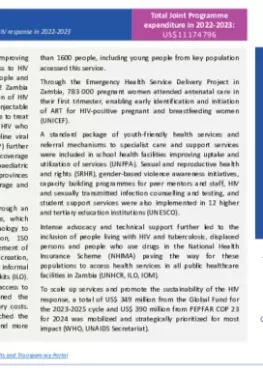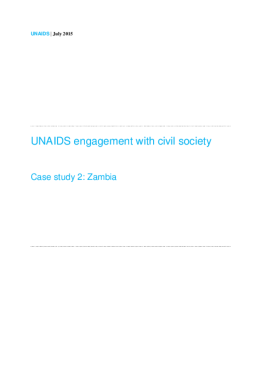|
Zambia
The Joint Programme support in Zambia focused on improving evidence for the HIV response while scaling up access to HIV services and education among adolescent, young people and key populations. The Government finalized the 2022 Zambia Consolidated Guidelines for Treatment and Prevention of HIV Infection, recommending the utilization of long-acting injectable Cabotegravir for HIV prevention; Tenofovir alafenamide to treat hepatitis B; resistance testing for people living with HIV who could not achieve viral suppression and use of baseline viral load testing. The National Health Care Package (NHCP) further integrated HIV with other essential universal health coverage services (WHO). Additionally, the newly developed paediatric HIV data dashboard is operational and used in five provinces improving real time monitoring and scaling up coverage and quality of paediatric HIV services (UNICEF).
Over 93 million male condoms were distributed through an innovative community condom distribution initiative, which relied on hotspots mapping and use of digital technology to further reach young people (UNFPA). In addition, 150 champions improved their understanding of management of HIV in the workplace, which led to HIV awareness creation, counselling and testing initiatives in formal and informal workplaces and the distribution of 12 500 HIV self-test kits (ILO). The newly established drone network for improved access to HIV prevention and testing commodities, shortened the turnaround time for test results and reduced delivery costs. With the Joint Programme’s support, Zambia launched the injectable pre-exposure prophylaxis (PrEP CAB-LA) and more than 1600 people, including young people from key population accessed this service.
Through the Emergency Health Service Delivery Project in Zambia, 783 000 pregnant women attended antenatal care in their first trimester, enabling early identification and initiation of ART for HIV-positive pregnant and breastfeeding women (UNICEF).
A standard package of youth-friendly health services and referral mechanisms to specialist care and support services were included in school health facilities improving uptake and utilization of services (UNFPA). Sexual and reproductive health and rights (SRHR), gender-based violence awareness initiatives, capacity building programmes for peer mentors and staff, HIV and sexually transmitted infection counselling and testing, and student support services were also implemented in 12 higher and tertiary education institutions (UNESCO).
Intense advocacy and technical support further led to the inclusion of people living with HIV and tuberculosis, displaced persons and people who use drugs in the National Health Insurance Scheme (NHIMA) paving the way for these populations to access health services in all public healthcare facilities in Zambia (UNHCR, ILO, IOM).
To scale up services and promote the sustainability of the HIV response, a total of US$ 349 million from the Global Fund for the 2023-2025 cycle and US$ 390 million from PEPFAR COP 23 for 2024 was mobilized and strategically prioritized for most impact (WHO, UNAIDS Secretariat).






